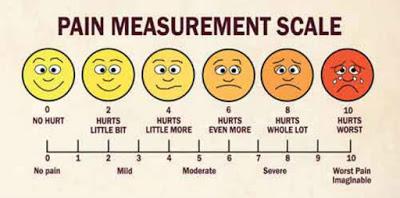
In Star Trek, there are characters like Spock, Data, Seven Of Nine and the Doctor who, while not "Asperger's" as such are often referred to as "Asperger-like" in their behavior. In the big bang theory, Sheldon has the most “Asperger’s-like” qualities and of course, there’s Doc Martin.
While for the most part, these characters aren't immune to physical pain, they're shown to have increased levels of tolerance -- and when it comes to mental pain, they're often depicted as "unaffected".
There’s clearly a perception out there that people with Asperger’s often feel “no pain” or “reduced pain” but how accurate is this?
Nobody feels “No Pain”
To be clear, nobody feels “no pain” unless they don’t have a fully functional nervous system. Some people clearly feel physical and/or emotional pain more acutely than others and some people respond more loudly to such pain.Much like a child who reacts loudly to a needle which has yet to prick their skin, a loud response doesn't necessarily indicate actual pain. By the same token, a quieter response should not necessarily indicate less pain.
Some individuals feel certain types of pain more acutely than others, while other individuals may feel it less. It's not uncommon for a person with a Sensory Processing Disorder (SPD), a common co-condition with Asperger's, to have both reactions to different stimulii, perhaps feeling the pain of a loud noise while not feeling the pain of a pinprick.
Unless we are the individual in question, our general comprehension of their level of pain is based purely on our perception, which in turn is based on what they say or do and our ability to read any non-verbal cues.
Of course, if you’re dealing with a person who is introverted, then all communication, including a lot of emotional communication, from that person is suppressed in comparison to an extrovert.
People with Asperger’s often don’t express emotions in the same way as neurotypicals. Sure, the "ouch" response is more or less the same but sometimes the facial expressions simply don't match the message.
Emotional Pain
 People with Asperger’s syndrome seem to suffer a great deal of emotional pain. There is evidence to suggest that the levels of depression and suicide amongst the Asperger’s community may be higher than it is in the overall neurotypical community.
People with Asperger’s syndrome seem to suffer a great deal of emotional pain. There is evidence to suggest that the levels of depression and suicide amongst the Asperger’s community may be higher than it is in the overall neurotypical community.People with Asperger’s often find it difficult to communicate with others under normal conditions, much less under deeply emotional ones. They often display conflicting body language and struggle to be understood. It’s also quite common for people with Asperger’s to fail to realize that the emotion is affecting them -- at least, not until it’s too late.
For this reason, it’s important to keep tabs on yourself if you have Aspergers -- or your dependents if they are the “aspies” in your life. It’s difficult but you need to talk about emotions and the best ways to express them. If a person you know has been involved in traumatic circumstances, you may want to check how they are feeling.
You’ll need to do this more than once as their feelings will change as they put distance between themselves and the circumstances. The responses won’t always improve with time.
The best way to do this is to ask very direct questions; so, instead of “How are you feeling?” try;
- Are you feeling a little overwhelmed?
- Do you feel like you need some help, is there something I can do?
- What do you think would cheer you up?
People with Asperger’s experience emotional pain just as much, often more, than neurotypical people. It’s just not so easy to detect.
Physical Pain
Physical pain and Asperger’s is a strange thing. It’s not that people with Asperger’s can’t feel it but rather that their preoccupation with special interests or general daily life can blind them to the sensations.It’s quite common for a person with Asperger’s syndrome who is obsessed with the computer or computer games to sit there for days at a time oblivious to cramps, muscle pains and tendon issues. It’s also one of the reasons why they often fail to seek medical attention before problems get out of hand.

When people with Asperger’s get involved in sports or exercise, they often put so much time and effort into training that, while they become very good at it, they also find themselves increasingly being injured due to muscle overuse.
Pain is an important sensation which alerts our body that we need to take a break from a stressful activity. If you continue to push past pain or if you ignore pain, you significantly increase the risks of a worse injury.
Give attention to Pain
People with Asperger's most certainly feel pain but for various reasons, they are less inclined to dwell on the pain or to communicate about it. Untreated mental and physical pain can be damaging.People with Asperger’s syndrome and those who care for people with Asperger's need to monitor their levels of pain and regularly question whether or not they are actually feeling pain in order to take better care of themselves.

